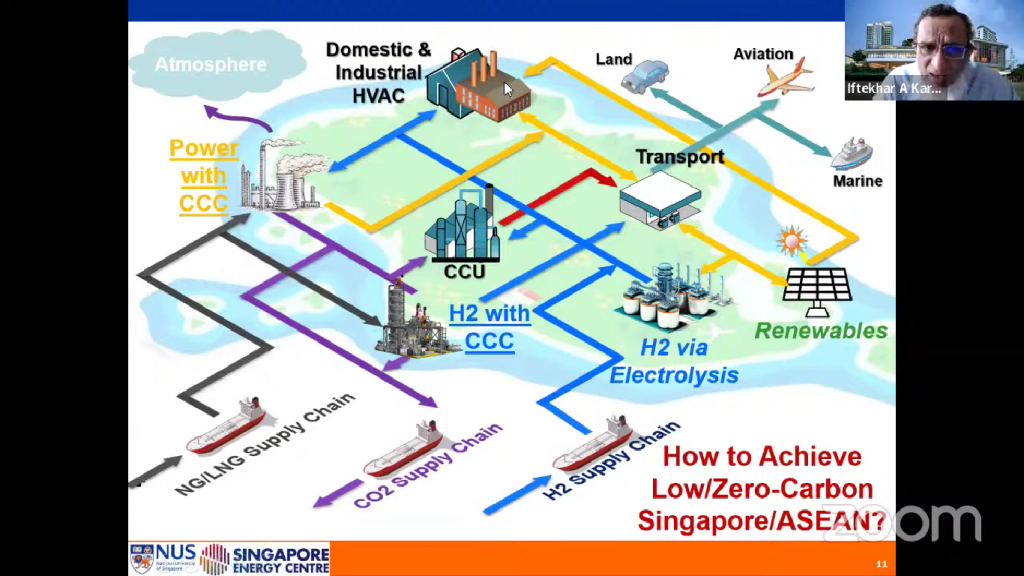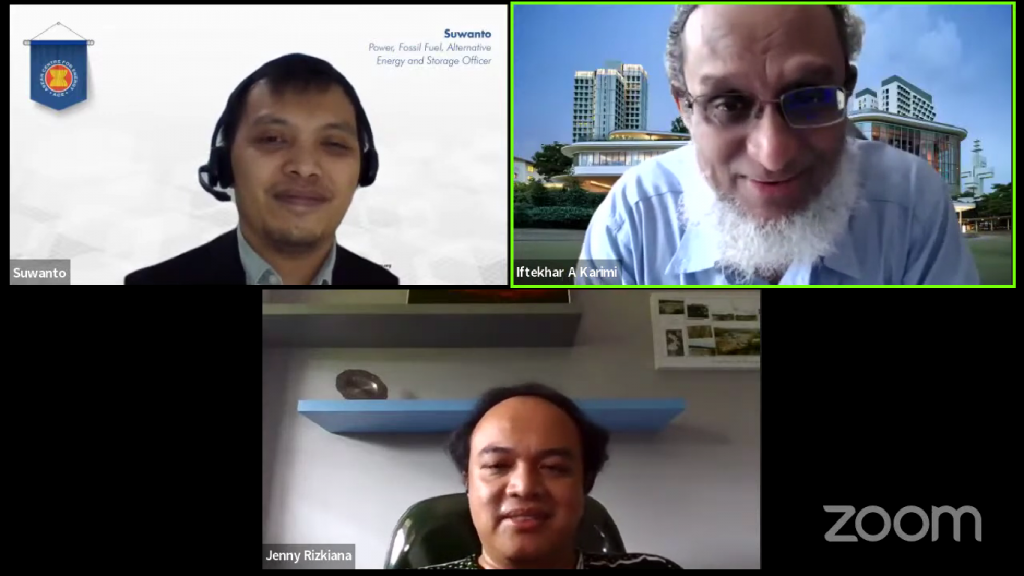Jakarta, 1 March 2022
As one of the efforts in enhancing interdisciplinary forum for the discussion of energy and/or climate change in ASEAN, ASEAN Climate Change and Energy Project (ACCEPT) held the 11th ASEAN Researchers Network on Energy and Climate Change (ARNECC) Paper Talks on 1 March 2022. The event discussed about a recently published paper entitled “Techno-enviro-economic analyses of hydrogen supply chains with an ASEAN case study”, which presented by one of the authors, Prof. Iftekhar A Karimi from National University of Singapore (NUS), and reviewed by Dr. Jenny Rizkiana from Bandung Institute of Technology (ITB). The event was moderated by ACCEPT Research Analyst, Mr. Suwanto.
Hydrogen is a promising low carbon fuel option, and its supply chains are vital for the future energy markets. Moreover, the hydrogen economy is receiving global attention. However, there are several challenges, in particular storage, transport, compression and liquefaction of hydrogen are energy intensive. This research aims to study hydrogen supply chains (HSCs) and their planning quantitatively with case studies on Singapore and ASEAN. Furthermore, this research answers the big question on how HSCs will evolve in ASEAN. One of the research tools used is Hydrogen Economy Assessment & Resource Tool (HEART), which is a user-friendly tool for developing hydrogen roadmaps and performing techno-enviro-economic and life cycle analyses. It configures, optimises and analyses HSCs over years.

(Photo Caption: Presentation by Prof Iftekhar A Karimi)
This research concludes that renewable energy and HSCs are attractive for ASEAN due to a diversity of natural resources, demand centres, and geography. Moreover, supply chain considerations are as critical as production. This research also summarises that local/regional production of hydrogen with Carbon Capture Utilisation and Storage (CCUS) has potential, direct use of ammonia (NH3) may have some edge over others, and ammonia and methylcyclohexane (MCH) as hydrogen carriers seems quite comparable and competitive over long distances. Techno-enviro-economic assessment of HSCs involves a complex interplay of several sectors. Therefore, decisions must be based on hard quantitative science rather than perceptions and guesses. Furthermore, produce-import and carriers of hydrogen need careful and rigorous studies.

(Caption: Discussion session with Mr. Suwanto, Prof. Iftekhar A Karimi, and Dr. Jenny Rizkiana)
Dr. Jenny pointed out that hydrogen production requires a huge amount of energy, and it is very important to find the best way to transport and store hydrogen. The use of liquid organic hydrogen carrier as Prof. Karimi mentioned has benefit because it is much easier to store and transport. However, the energy penalty in using cyclohexane or methylcyclohexane and ammonia is quite high. Dr. Jenny suggested another organic compound which is formic acid. He explained that there is research proving that with the use of a certain catalyst, formic acid can be decomposed to produce hydrogen at room temperature. Therefore, the energy penalty is very low.
Prof. Karimi answered Mr. Suwanto question about pipeline network in ASEAN that is important for not only hydrogen transport but also CO2 and natural gas transport. However, the use of those pipelines for high concentration hydrogen remains a question to be answered due to pipeline integrity issues. Prof. Karimi also mentioned about his current research about a hybrid method in producing hydrogen which involves Steam Methane Reforming (SMR) with Carbon Capture and Storage (CCS) and biomass gasification, which would be a very good option considering the high number of natural resources in Indonesia and Malaysia. Dr. Jenny also has research about a derivation of hydrogen production from biomass.
Referring to the current publication of ASEAN Centre for Energy (ACE) on hydrogen technology in ASEAN, Mr. Suwanto asked the outlook of hydrogen cost which is still a major challenge in ASEAN and how incentives can solve it. Prof. Karimi pointed out that the incentives mechanism is specific for each government. The challenge could be overcome once we have found a cheaper way to produce green hydrogen.
Responding to ACE’s initiative to establish ASEAN hydrogen expert panels, Dr. Jenny explained how communication between ASEAN countries is important. Prof. Karimi emphasized that informed decisions are very important. Information is specific to certain situations, and it is crucial to have tools like HEART. Informed decisions only come with model and optimisation. Therefore, the role of academics is vital in the development of hydrogen technology in ASEAN.
Mr. Suwanto concluded the event by promoting ARNECC which provides an interdisciplinary forum for the discussion of social, economic, governance and technical issues related to energy and/or climate change. ARNECC links scholars, analysts, researchers, and other stakeholders across ASEAN to enhance broader knowledge and insights related to energy and climate change. Hence, not only will it enhance the coherence between the ASEAN energy and climate policies, but it will also contribute to more climate-friendly development of the energy sector.
(SNF)